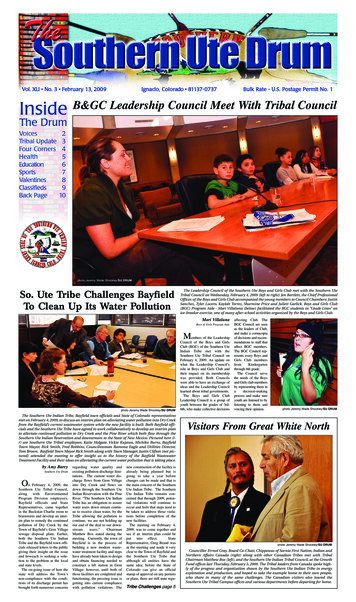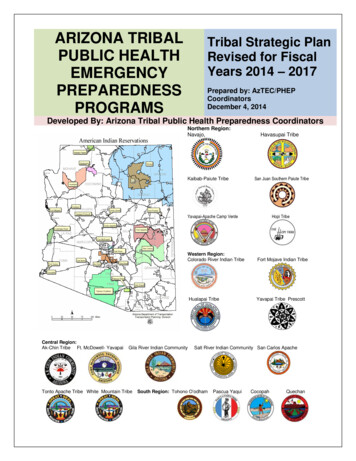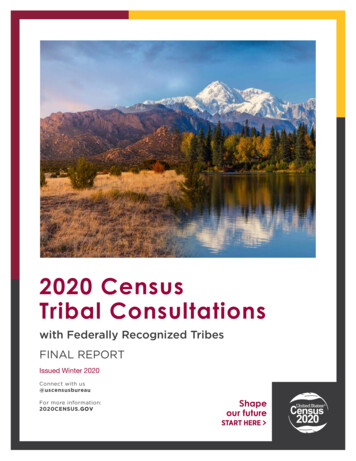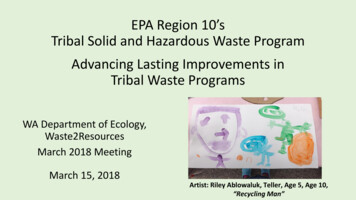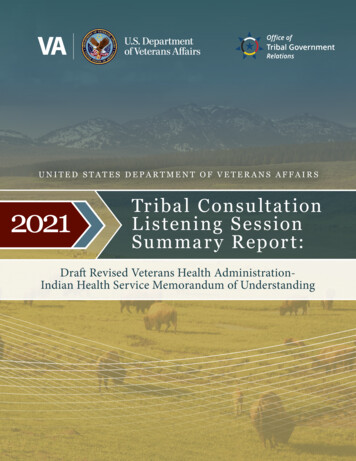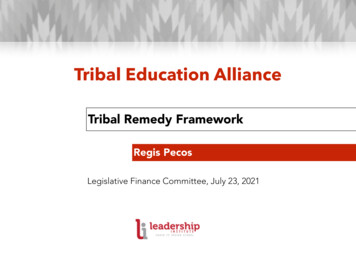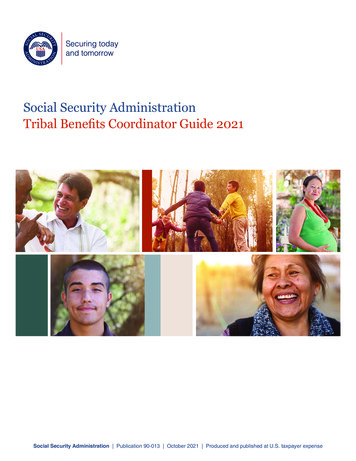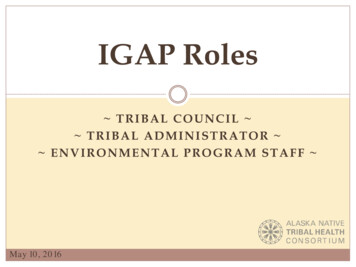
Transcription
IGAP Roles TRIBAL COUNCIL TRIBAL ADMINISTRATOR ENVIRONMENTAL PROGRAM STAFF May 10, 2016
ANTHC Webinar Training SeriesThis training series is made possible through an Indian GeneralAssistance Program (IGAP) grant from the U.S. EPA.The current training schedule was developed based on unmet training needsexpressed by tribal programs during statewide gatherings, training sessions andduring one-on-one discussions.We are not EPA employees. Specific questions relating your individual IGAP grantmay need to be referred to your EPA Project Officer.Information and examples provided during this training were compiled based onpersonal experience as a Tribal Administrator, IGAP employee and publicallyavailable resources developed by EPA and others.** The content for this training webinar includes suggested roles of variousstakeholders to improve GAP grant management within your Tribe. **
What is IGAP? EPA Indian Environmental General Assistance Program. Grants or Cooperative Agreements to tribes and tribal consortia. Range between 30K - 128K per year for up to four years. Provided to help build tribal capacity to plan, develop and administer tribalenvironmental protection programs consistent with thefederal laws that the EPA is charged withimplementing. Intended to assist tribes with opportunitiesfor meaningful participation in policymaking and standard setting.Information for the IGAP Guidance on the Award Management of General Assistance Agreements for Tribes and Intertribal Consortia (May 15, 2013)
Typical Activities Establish an environmental program office. Hire and Train Staff Purchase Office Spacedesk, chair, shelves etc. Purchase Supplies(less than 5000) computers, printers, software. Purchase Equipment(equal or greater than 5000) Vehicle for program operations,sampling, measuring & analysis equipmentPurchases must be outlined in your GAP Budget and approved by your EPA Project Officer. Revisions are allowed, but they must be approved.
Typical Activities Review or Develop Administrative & Financial Capabilities Policies and ProceduresRoles & Responsibilities, Payroll procedures, Travel procedures Financial SystemsAcquire electronic tracking systems for payroll, annual audits Developing Legal InfrastructureDeveloping and enforcing ordinances, developing resolutions Administrative & Financial Management Support
Typical Activities Baseline Needs Assessments Evaluate environmental conditionsgather existing data, gather new data, analyze data, identifypriorities. A Quality Assurance Project Plan (QUPP) may be required. Environmental Planning Create short & long term goals Develop/Update EPA-TribalEnvironmental Plans (ETEPs) Develop Media-Specific Plans(solid waste, air, water, etc)
Typical Activities Outreach and Education Newsletters, websites, radio announcements, social media Youth engagement activities, in-school activities Community gathering and meetings Trainings and Conferences Host community trainings – supplies, trainer fees, material Attend trainings to increase knowledge Attend local, regional, state and nationalenvironmental forums
Allowable Activities & Costs Code of Federal Regulations 2 CFR 200 2 CFR 1500 40 CFR 33 and 40 CFR 35 Subpart B 2013 GAP Guidance EPA Project Officer
Your IGAP TeamUS EPA ProjectOfficerTribal CouncilTribalAdministrator /BookkeeperTribalEnvironmentalProgram Staff
EPA Project Officer Roles EPA’s designated contact Provides technical and programmaticassistance Reviews proposals and suggestsrevisions Monitors project progress andprogrammatic performance Works with recipient to help identifyenvironmental outcomes of work plan Join in tribal council meeting via teleconference to answer bal-program
GAP Recipient Roles (The Tribe) Develops and submits the IGAP proposal Accepts the award Completes the work plan activities Spends funds in accordance with approved GAP budget Grant Management Communicates and updates EPA on progress and changes Attends conferences/training to stay current on environmental issues and buildcapacity within the GAP program and Tribe
Tribal Council Roles Tribal Councils are the governing bodies of federally recognized tribes. Good leadership is a primary role and responsibility for Tribal Council Members. Great Tribal Council members know exactly wherethe tribal government is at. Tribal Councils are responsible for the planning forthe community. Tribal Council members should refrain frominterfering with the day to day operations oftribal staff and rely on the authorized chain.
Tribal Council and IGAP Guides the work written into the GAP work plan according to tribal priorities. Reviews and signs all the grant application documents. Accepts the IGAP Grant Award. Supports IGAP Staff. Reviews IGAP staff reports to understandactivities.
Administrator / Bookkeeper Roles Overall administration, supervision and evaluation for all programs, employeesand infrastructure for the Tribal Council. Ensures Tribal Policies and Proceduresare followed. Manages the day-to-day operations of the tribe. Oversees and supports all tribal staff with programmanagement, grant writing, and other supervisorfunctions. Oversees implementation of tribal plans. Reports to the Tribal Council.
Administrator / Bookkeeper Roles Assists program staff develop grant budgets. Reviews budgets with program staff on a regular basis. Approves expenditures for all programs according to approved budgets, tribalpolicies and grantor regulations. Provides financial information to the tribal council. Helps to prepare and submit grant drawdowns. Prepares for annual audits (if applicable)
Administrator / Bookkeeper and IGAP Supervisors the IGAP Coordinator. Oversees the work of the IGAP program. Assists in preparing GAP grant application. Ensures administrative compliance with grant.(Administrator or Bookkeeper) Tracks expenditures. Prepares and submits drawdowns and financial reports. Reviews budgets regularly with GAP Staff. Works with GAP staff to clarify questions from the Tribal Council. Assists with grant close-out requirements.
Environmental Program Staff Roles Writes the GAP grant proposal and carries out thework according to the approved work plan. Seeks and Develops other grant applicationsfor environmental program sustainabilitybased on community plans. Maintains program and administrativefunctions to help build tribal capacity. Carries out all work according to approvedgrant work-plan and budgets.
Environmental Program Staff Roles Tracks activities and expenditures. Reviews budgets. Prepares and submits quarterly reports, trip reports, etc. Provides community environmental education. Communicates regularly with EPA and theAdministrator/Bookkeeper. Provides updates to Administrator and Tribal Councilas needed/requested. IGAP Coordinator oversees staff working under the GAP .pdf
Tribal Council Guides the workwritten into the GAPwork plan according totribal priorities.Administrator Oversees the work ofthe IGAP Staff. Assists in preparingGAP Grant application. Reviews and signsgrant applicationdocuments. Ensures administrativecompliance with grant. Accepts the IGAPGrant Award.Bookkeeper Provides support forGAP Staff. Maintains Tribalpolicies andprocedures. Tracks expenditures. Preforms drawdowns. Reviews budgetregularly with GAPStaff.Env. Program Staff Carries out the workaccording to theapproved work plan. Tracks activities andexpenditures. Reviews budgets. Completes thequarterly reporting. Communicates withEPA, Administratorand Bookkeeperregularly. Writes GAP Grant.This is an example and not extensive for all responsibilities. Actual roles are determined by tribal leadership.
Conflict at Work By understanding roles of each person involved in the administration of the IGAPgrant, the potential for conflict can be minimized. EPA does not play referee. It’s not their job to manage conflicts within the tribe. It’s up to tribal leadership to resolve internal issues so they don’t impact work. If conflicts escalate, it can have negative consequences on program results.
“When we learn how to work together versus against each other things might start getting better.”
QuestionsOxcenia O’DominTribal Environmental Program AdministratorP: 907-729-3492 F: 1-888-500-1205 orodomin@anthc.orgDesirae RoehlTribal Environmental Program ManagerP: 907-729-3496 F: 1-888-500-1205 droehl@anthc.org
Tribal Councils are the governing bodies of federally recognized tribes. Good leadership is a primary role and responsibility for Tribal Council Members. Great Tribal Council members know exactly where the tribal government is at. Tribal Councils are responsible for the planning for the community.
